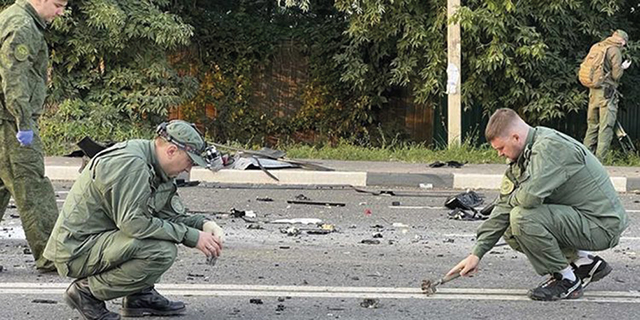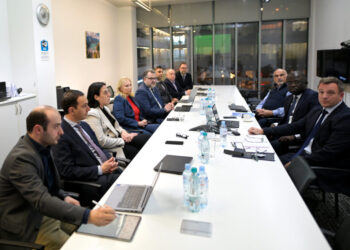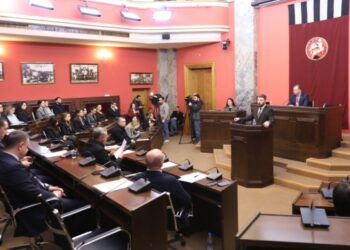A Russian missile attack killed 22 civilians and set a passenger train on fire in eastern Ukraine, officials in Kyiv said, with missiles striking north of the capital as Ukraine marked its Independence Day on August 24 under heavy shelling.
In video remarks to the United Nations Security Council, President Zelensky said rockets hit a train in the small town of Chaplyne, some 145 km (90 miles) west of Russian-occupied Donetsk in eastern Ukraine.
“Chaplyne is our pain today. As of this moment there are 22 dead,” he said in a later evening video address, adding that Ukraine would hold Russia responsible for all it had done.
Zelensky aide Kyrylo Tymoshenko later said Russian forces had shelled Chaplyne twice.
A boy was killed in the first attack when a missile hit his house, and 21 people died later when rockets hit the railway station and set fire to five train carriages, he said in a statement.
The Russian defense ministry did not immediately respond to a request for comment. Russia denies targeting civilians.
“Russia’s missile strike on a train station full of civilians in Ukraine fits a pattern of atrocities. We will continue, together with partners from around the world, to stand with Ukraine and seek accountability from Russian officials,” US Secretary of State Antony Blinken said on Twitter.
There were also six explosions during a rocket attack on the Vyshgorod region directly north of Kyiv, but there were no casualties reported, regional official Olexiy Kuleba said.
“Two impacts were recorded. There were no casualties or injuries among civilians. There were no fires or destruction of residential buildings or infrastructure,” Kuleba wrote on Telegram on Thursday morning.
“The other explosions heard by the residents of the region were ‘the work’ of our air defences,” he said.
Russia’s military avoided Kyiv on the Ukrainian holiday and targeted frontline towns such as Kharkiv, Mykolaiv, Nikopol and Dnipro with artillery attacks, Ukraine presidential adviser Oleksiy Arestovych said.
Celebrations of the August 24 public holiday were canceled, however, many Ukrainians marked the occasion by wearing embroidered shirts typical of the national dress.
Russia Expected to Put Azov Soldiers on Trial in Mariupol
Separately, Kyiv submitted information to international legal bodies about Russian plans, described by the UN officials on Tuesday, to put captured Ukrainian fighters from the Azov Regiment on trial in Mariupol, officials said.
The port city fell to Russian forces in April after weeks of intense shelling as they encircled Ukrainian holdouts at the Azovstal Steel Plant.
Presidential adviser Arestovych said Zelensky made clear Kyiv would “never, ever” consider peace negotiations with Moscow if the trials went ahead.
US Secretary of State spokesperson Ned Price said the unlawful process would amount to a “mockery of justice.”
Kyiv Denies Killing Putin Ally’s Daughter, Russia Opens Investigation
The daughter of a key Kremlin adviser was killed in an explosion while driving near Moscow, a dramatic attack that became a new flash point in the six-month war.
The daughter of Alexander Dugin, referred to as Russian President Vladimir Putin’s “brain,” was killed in a car explosion in the Moscow region, according to Russia’s main investigative authority, which said it was opening a criminal murder investigation. Daria Dugina, 29, was reportedly driving her father’s car from a festival they had both attended when the vehicle erupted in flames, reported Russia’s state-run media outlet Tass.
Ukraine denied involvement and suggested it could be the result of an internal dispute within Russia.
Dugina had been sanctioned by the United States as part of a list of Russian elites and Russian intelligence-directed disinformation outlets, alongside her father, who has been designated for sanctions since 2015.
The key battlefield developments are as follows:
Russian shelling in a small central Ukrainian city killed at least one person, injured seven others and destroyed homes and a school building, local officials said. The Sunday strike, in the Dnipropetrovsk region, is at least the second major attack on the area, which has come under increased fire as the standoff over the nearby Zaporizhzhia nuclear plant has escalated.
Western leaders discussed the Zaporizhzhia nuclear plant Sunday. According to a White House statement announcing their phone call, they shared their desire to “avoid military operations” near Europe’s largest nuclear plant. They also advocated for the International Atomic Energy Agency to assess the area’s safety systems as soon as possible.
Putin said he supports allowing United Nations experts to inspect the plant and agreed to provide “necessary assistance” during a call with French President Emmanuel Macron. However, Moscow has rejected broader requests to withdraw its military from the site, and has accused Ukraine of shelling the facility and preparing to cause a “radiation leak” there.
Drone attacks, including one on the headquarters of Russia’s Black Sea fleet, were reported in Crimea on Saturday. The governor of Sevastopol, a Russian appointee, said a drone hit the roof of the fleet’s headquarters after Russian forces were unable to shoot it down. But he later reversed his claim, saying in a “clarification” on Telegram that the drone was struck and landed on the roof, catching fire. “There was no defeat,” he wrote. The claims could not be independently verified.
Russian forces’ attempted advance toward the southern city of Mykolaiv, which they have shelled repeatedly in recent days, has seen “partial success,” the Ukrainian army conceded in one of its regular updates. Moscow’s soldiers now occupy a small settlement less than 30 miles from Mykolaiv, but “combat is ongoing,” the army reported.
Two more ships carrying grain and sunflower oil left Ukraine over the weekend, Turkey’s Defense Ministry said. They left the port of Chornomorsk, close to Odesa in southwest Ukraine, bringing the total number of ships to have sailed out under an UN-backed deal to 27.
The United States has presented to NATO officials instruments of ratification for Sweden’s and Finland’s accession to the military alliance, Secretary of State Antony Blinken said. The war has seen moves to expand NATO, and Blinken said handing in the documents was “the final step in our process to have these important partners become vital NATO Allies.”
By Ana Dumbadze














